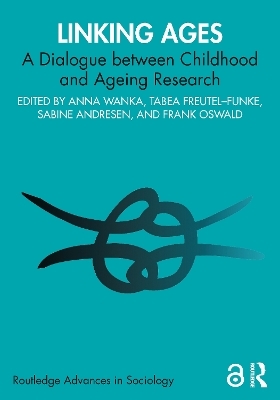
Linking Ages
Routledge (Verlag)
978-1-032-55169-2 (ISBN)
By asking what childhood and ageing research can learn from each other, this edited volume brings both fields into a fruitful dialogue. It touches upon topics like theories and method(olog)ies, space and time, health and care, technologies and digitalization, play, work and consumption, as well as violence, well-being and childrens’ and older peoples’ rights.
This volume will appeal to scholars and students interested in childhood studies and ageing studies/gerontology located in a range of disciplines, from sociology to social work, social and cultural anthropology, educational sciences, human geography, architecture, urban planning, architecture, health and disability studies, nursing studies, political sciences and law.
Anna Wanka leads a DFG-funded Emmy-No ether research group on “Linking Ages – The Socio-Material Practices of Un/Doing Age across the Life-Course” at Goethe University, Frankfurt, Germany. Tabea Freutel-Funke, MA, is a researcher at the University of Stuttgart specialized in childhood and qualitative research methods and a first moment Linking Ages funding member and enthusiast. Sabine Andresen is Professor of Social Pedagogy and Family Research at the Department of Educational Sciences at the Goethe-University in Frankfurt/Main. Frank Oswald, PhD, is Professor for Interdisciplinary Ageing Research (IAW), Chair of the Frankfurt Forum for interdisciplinary Ageing Research (FFIA) at the Goethe University, Germany and Director of the Center AGING for Early Career Researcher at the Goethe Graduate Academy (GRADE).
Section I: Theories of childhood and later life
Linking Ages – An Invitation to a New Agenda in Life Stage Research
1. Age Matters: Linking Age-Related Concepts in Childhood and Ageing Research
2. I just want to help! – Autonomy violation in children and older adults
Section II: Method(ologie)s of childhood and ageing research
3. Rethinking Life Stories in the Context of Civic Engagement: The Life Diagram and its Potential for Ageing and Childhood Research
4. Linking Ages: Developing Walking Methods for Lifecourse Research
5. ‘I wish they’d stop eating the props!’ – Two Novice Researchers’ Refection on their Participatory Research with Children and Older People
6. Linking Ages - Reflexive Transition Research in Childhood and Later Life through Interpretations with Change of Sign
Section III: Empirical insights from a Linking-Ages perspective
IIIa. Ageing in time and place
7. Age Transitions Crossing Childhood, Youth and Old Age: Approaching Space and Age Relationally from an Urban Everyday Life Perspective
8. Age-based representations of time. Re-thinking temporalities through intergenerational encounters
IIIb. Playfulness as a link between childhood and later life
9. Play Across the Life Course: An Anthropology of Play in Childhood and Old Age
10. Planning for Play
IIIc. Growing up and old in a digitized world
11. Technological Relationality and Transforming Perceptions of Childhood
12. "What shall I write tomorrow?" When older women reclaim new life course on Facebook
IIId. Un/doing age in work and consumption
13. In and out of the labour market – A Linking Ages Perspective on labour market transitions in early and late adulthood
14. Different life phases and the limits of consumption: opportunities and barriers
IIIe. Experiencing violence in childhood and later life
15. Testimonies about child sexual abuse in the 1950s. Bearing witness and the concept of linking ages
16. Does an abusive family history cause elder abuse and neglect?
17. Protection From Violence in Home Care Settings for Older Adults and Lessons Learned from Child Protection
18. Un/Doing Violence and Un/Doing Care – Mapping Boundary-Making Practices of Violence in Elder Care from a Transdisciplinary Perspective
IIIf. Linking Ages perspectives on health and care
19. Children of old age? Infantilization of people living with dementia
20. To be Seen and Heard: Relational Caring Meets Lived Childhoods in Relationships Between Young Children and People Living with Dementia in Long-term Care Homes
21. The generational conflict as a social construct of certainty to manage the ambiguities of the corona crisis
IIIg. Children’s and older adults’ rights and wellbeing
22. ‘I thought I was going to die’: Bodily Autonomy and the Misuse of Restrictive Practices in Aged Care and Youth Detention Settings
23. Revisiting the Cascais Protocol – Age constructions and reconstruction in an ageing policy design process
24. Investigating the Association between Childhood Circumstances and Old Age Quality in Ghana
Conclusion
25. Conclusions: A Linking Ages Dialogue between Childhood, Age Studies, and Beyond
| Erscheinungsdatum | 14.11.2024 |
|---|---|
| Reihe/Serie | Routledge Advances in Sociology |
| Zusatzinfo | 18 Tables, black and white; 20 Line drawings, black and white; 9 Halftones, black and white; 29 Illustrations, black and white |
| Verlagsort | London |
| Sprache | englisch |
| Maße | 178 x 254 mm |
| Gewicht | 925 g |
| Themenwelt | Sachbuch/Ratgeber ► Gesundheit / Leben / Psychologie |
| Studium ► Querschnittsbereiche ► Prävention / Gesundheitsförderung | |
| Naturwissenschaften ► Geowissenschaften ► Geografie / Kartografie | |
| Sozialwissenschaften ► Pädagogik ► Vorschulpädagogik | |
| ISBN-10 | 1-032-55169-0 / 1032551690 |
| ISBN-13 | 978-1-032-55169-2 / 9781032551692 |
| Zustand | Neuware |
| Informationen gemäß Produktsicherheitsverordnung (GPSR) | |
| Haben Sie eine Frage zum Produkt? |
aus dem Bereich


